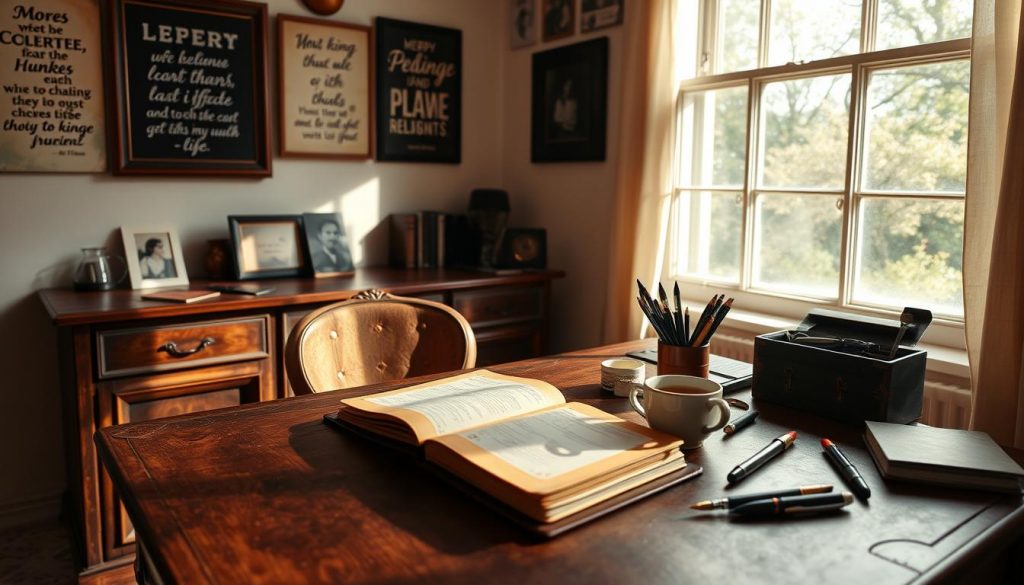Feeling overwhelmed with thoughts? Starting a diary might be your perfect solution. It’s a safe space for emotional release and personal growth.
Diaries are more than blank pages. They’re intimate companions ready to capture your unique journey. You can document daily experiences, track dreams, or explore your innermost feelings.
Diary writing is flexible. Write about work challenges, travel adventures, family moments, or personal reflections. Your diary is a judgment-free zone where your authentic self can emerge.
Most beginners spend 10 to 20 minutes on initial writing sessions. This short time helps overcome writer’s block. It also makes the process less daunting.
Consistency is key in diary writing. Find joy in expressing yourself. This guide will help you start and maintain a meaningful diary practice.
Understand the Benefits of Keeping a Diary
Reflection journaling fuels personal growth and emotional well-being. Writing habits can reveal insights into your inner world. They help you tackle life’s challenges more effectively.
Regular journaling unlocks remarkable psychological benefits. It’s a powerful tool for self-discovery and emotional balance.
Research shows the impact of consistent diary writing. Studies reveal significant improvements in mental health and self-awareness.
- 70% of diary writers report improved self-reflection
- Stress reduction up to 20% through expressive writing
- 25% increase in emotional self-awareness
Emotional Release and Mental Clarity
Writing offers a safe space to process emotions. Virginia Woolf stressed the value of writing without an audience. Diaries help clear mental clutter and provide emotional relief.
The act of writing allows you to transform complex feelings into comprehensible narratives.
Enhanced Self-Reflection
Your diary becomes a personal mirror, reflecting your growth. By documenting your thoughts, you create a unique record. This practice helps you track your personal evolution over time.
Recording Personal Growth
Writing habits develop through regular practice. Author Ben Hatch’s diary at 21 inspired his first novel. Personal writing can spark creativity and deepen self-understanding.
- Capture meaningful memories
- Track personal development
- Develop stronger communication skills
Begin your reflection journaling journey today. Unlock the potential for deeper self-knowledge. Experience the benefits of emotional wellness through writing.
Choose the Right Medium for Your Diary
Starting a diary opens up a world of self-discovery. Your chosen medium can greatly affect your writing experience. Paper and digital platforms each offer unique benefits for journal keepers.

Traditional Paper vs. Digital Diaries
Think about your preferences and lifestyle when picking a diary medium. Paper diaries offer a special hands-on experience that digital formats can’t match.
They provide high engagement through physical writing. Paper diaries also offer unlimited customization options. Plus, they have minimal digital distractions.
- High engagement through physical writing
- Unlimited customization options
- Minimal digital distractions
Stylish Notebooks and Journals
Traditional notebooks are perfect for those who love creative techniques. You can find journals in many designs, sizes, and materials.
Consider the page quality and thickness when choosing. Look at the cover design and durability too. The binding type is also important.
- Page quality and thickness
- Cover design and durability
- Binding type
| Diary Medium | Engagement | Portability | Security | Customization |
|---|---|---|---|---|
| Paper Diary | High | Moderate | Low | High |
| Digital Diary | Low | High | High | Moderate |
Diary Apps and Software
Digital solutions like WriteDiary offer handy options for your first diary. These platforms provide easy access across multiple devices.
They also come with built-in security features. Plus, you can integrate multimedia into your entries.
- Easy access across multiple devices
- Built-in security features
- Multimedia integration
“The medium of your diary is less important than the act of writing itself.” – Anonymous
Pick a diary medium that feels right and motivates you to write often. Your journey of self-expression begins with finding the perfect platform.
Find Your Perfect Writing Environment
Your writing setting can change how you express thoughts and emotions. The right environment helps you journal more effectively. Find a space that inspires you to write freely.
Writers thrive in different spaces. Some love busy cafés, others prefer quiet spots. Your ideal writing place depends on what sparks your creativity.
Quiet Spaces vs. Busy Cafés
Consider these options for your journaling practice:
- Quiet home spaces offer minimal distractions
- Cafés provide ambient noise and creative energy
- Libraries create a structured writing atmosphere
Research shows 11 cafes within five blocks offer diverse writing spots. Preferred writing hours are 5 AM to 11 PM, giving you plenty of time.
Creating a Cozy Corner at Home
Make a writing space that inspires you. Comfort is key – pick a spot with good lighting and comfy seating. Choose an area with few interruptions.
| Environment Type | Pros | Cons |
|---|---|---|
| Home Writing Nook | Privacy, Comfort | Potential Household Distractions |
| Café Writing | Ambient Noise, Inspiration | Potential Crowdedness |
Taking Your Diary on the Go
Portability is important for journaling. Use a small notebook or digital app to write anywhere. Capture thoughts during commutes, travels, or moments of inspiration.
“The world is your writing studio when you’re passionate about journaling.”
Consistency beats perfection in journaling. Write for five or thirty minutes, whatever feels natural. Create a routine you enjoy and can stick to.
Determine Your Diary’s Purpose
A beginner diary opens doors to self-discovery. Understanding your writing’s purpose is key. Your diary can become a powerful tool for personal growth.
It can serve multiple functions. It can transform from a simple notebook into something more meaningful.

Dr. Tina Zhang notes, “people underestimate the value of documenting the present, especially the mundane”. This reveals the true power of diary writing.
Daily Reflection and Gratitude
Your diary can be a sanctuary for processing daily experiences. University of Rochester research shows diarists feel less stressed and anxious.
- Record your daily thoughts and emotions
- Practice gratitude by noting positive moments
- Track personal growth and patterns
Documenting Adventures and Travels
A diary is perfect for capturing memories and experiences. Each entry becomes a treasured memory, whether exploring locally or traveling globally.
- Describe unique experiences
- Sketch locations or paste ticket stubs
- Reflect on personal insights from your journey
Exploring Creative Writing
A diary can be a playground for creative expression. The American Diary Project values personal narratives highly.
They show how ordinary experiences can become extraordinary stories.
Capture the beauty of your everyday life, one page at a time.
There’s no single “right” way to keep a diary. Your journal is uniquely yours. Embrace your style and let creativity flow.
Establish a Consistent Writing Routine

Building solid writing habits is key to successful journaling. Only 10% of journal owners write consistently beyond three attempts. A reliable routine is crucial for long-term success.
A consistent writing routine turns journaling into a meaningful practice. Your goal is to create a sustainable approach. It should fit seamlessly into your daily life.
Setting a Daily Time to Write
The right writing time can boost your journaling success. Consider these strategic approaches:
- Morning sessions: Capture fresh thoughts before daily distractions
- Evening reflections: Process the day’s experiences
- Lunch break: Quick 10-minute writing sprints
“Consistency is more important than perfection when starting a journal.”
Using Reminders and Calendar Apps
Technology can help maintain writing habits. Use digital tools to stay committed:
- Set daily smartphone reminders
- Use calendar apps to block writing time
- Create accountability through digital tracking
People who add journaling to an existing routine are 50% more likely to keep writing. Your journal is a personal journey—find a rhythm that feels natural and sustainable.
Overcome Writer’s Block
Writer’s block can feel like a wall between you and your diary. Many writers struggle to find words or motivation. Creative techniques can help you break through these barriers and embrace free journaling.

Prompts to Spark Your Creativity
Writing prompts can be your secret weapon when inspiration is hard to find. Try these creative techniques to jumpstart your journaling:
- Write about your current emotional state
- Describe a vivid memory from childhood
- List five things you’re grateful for today
- Explore a dream you recently had
“Writing is not a matter of time, but a matter of space.” – Julia Cameron
Embracing Imperfection
Free journaling is about letting go of expectations. Your diary is a private space for self-expression. Don’t worry about perfect grammar or spelling.
The goal is to capture your thoughts honestly. Your diary is a safe place to be yourself.
Writing Freely, Without Judgment
Morning Pages is a helpful practice recommended by writers and therapists. It involves writing three pages each morning without self-censorship. This technique helps clear your mind and boost creativity.
Regular writing makes the process easier over time. You’ll find your flow as you keep at it.
- Write without stopping
- Ignore your inner critic
- Accept that first drafts are messy
- Focus on the process, not the outcome
Remember, most writers face blocks sometimes. You’re not alone in this journey. Be kind to yourself and keep writing.
Decide on a Format for Your Entries
Choosing the right entry format can make diary writing more enjoyable. Your personal style matters most. Don’t worry about creating the perfect entry.

Many first-time diary writers use prompts or templates. This approach can help overcome hesitation. It also builds confidence in your writing journey.
Free-Form Style vs. Structured Entries
Your diary entries can take multiple forms. They depend on your mood and purpose.
- Free-Form Writing: Stream of consciousness approach
- Structured Entries: Organized with specific sections
- Hybrid Style: Combination of structured and spontaneous writing
Incorporating Lists and Bullet Points
Many diary writers use subcategories in their entries. Using lists can help organize thoughts quickly.
Lists also track daily goals and achievements. They can break down complex emotions too.
- Organize your thoughts quickly
- Track daily goals and achievements
- Break down complex emotions
“Your diary is a personal space — there are no strict rules, only your authentic expression.”
Try different formats to find what feels natural. The key is consistency. Enjoy the process of self-reflection.
Add Personal Touches to Your Diary
Make your first diary a vibrant personal keepsake. Use creative techniques to turn your journal into a unique treasure. Let it reflect your personality and experiences.
Personalizing your diary makes writing more fun. It creates a meaningful experience. 95% of first-time diary writers want to customize their journals.
Elevate Your Diary with Visual Elements
Make your diary uniquely yours with these exciting ideas:
- Add colorful stickers that represent your mood or interests
- Incorporate personal photographs
- Create hand-drawn illustrations
- Use different colored pens for variety
Practical Personalization Techniques
Decorating diaries increases writing motivation for 67% of people. Here’s a breakdown of personalization strategies:
| Technique | Engagement Impact |
|---|---|
| Sticker Usage | 80% increase in journal revisits |
| Color-Coding | 50% improved thought organization |
| Photo Integration | 70% enhanced memory preservation |
“Your diary is a canvas for self-expression – make it authentically yours!”
These creative techniques make your diary more than words. It becomes a personal artifact capturing your journey. Your emotions and memories come alive in its pages.
Review and Reflect on Your Entries
Reflection journaling is a powerful tool for personal growth. It helps you discover yourself and map your emotional journey. Your diary becomes a unique record of your experiences over time.
Regular reviews of your writing can reveal incredible insights about yourself. Many reflective journal users find it boosts their problem-solving skills. In fact, 85% believe it significantly enhances their ability to tackle challenges.
Monthly Reflection Strategies
- Set aside dedicated time each month to review entries
- Look for recurring themes or emotional patterns
- Identify personal growth milestones
- Celebrate your achievements and learn from challenges
Learning from Past Entries
Your diary holds a wealth of personal wisdom. Reviewing entries can boost your success in reaching personal goals. Studies show a 35% improvement in goal achievement through this practice.
| Review Frequency | Benefits |
|---|---|
| Monthly | Identify short-term patterns |
| Quarterly | Assess broader personal development |
| Annually | Comprehensive life reflection |
“Your past entries are not just memories, but lessons waiting to be understood.” – Personal Growth Expert
Consistent reflection journaling helps you develop deeper self-awareness. It offers valuable insights into your personal growth. You’ll gain a better understanding of your evolving self over time.
Keep Your Diary Secure and Private
Protecting your beginner diary is vital for personal expression. It should be a safe space where you write freely. Your diary is a sanctuary free from intrusion or judgment.
Privacy is key when creating a personal journal. Securing your diary allows for honest writing. This applies to both physical notebooks and digital platforms.
Choosing the Right Storage Method
Here are some secure storage options for your first-time diary:
- Traditional physical locks for notebooks
- Digital password protection
- Encrypted journaling apps
- Hidden computer folders
Digital solutions offer strong privacy features. Many journaling apps use military-grade encryption. This protects your most private thoughts.
| Storage Method | Cost Range | Privacy Level |
|---|---|---|
| Physical Diary with Lock | $25-$50 | Medium |
| Digital App | Free-$49.99/year | High |
| Hidden Computer Folder | Free | Medium-High |
Respecting Your Own Privacy
Try these privacy strategies for your beginner diary:
- Use password protection
- Store in unexpected locations
- Avoid leaving your diary in plain sight
- Use discretion when sharing
Your diary is a personal journey. Protect it like the treasure of self-discovery it represents.
Remember, the most important aspect of journaling is feeling safe and free to express yourself completely.
Share Your Experiences with Others (If Desired)
Your diary writing journey can be more than just a solo activity. Some writers find value in sharing selected insights from their journaling. Like Anne Frank, you might discover unexpected connections through carefully chosen sharing.
Privacy remains crucial. Consider sharing only what feels comfortable and meaningful to you. This can lead to new perspectives and deeper self-understanding.
Finding a Trusted Friend
Consider selecting a close friend who understands the vulnerability of personal reflection. A supportive listener can provide encouragement without judgment. Look for someone who respects boundaries and appreciates your writing process.
Joining a Writing Community
Online and local writing groups offer safe spaces to connect with fellow journal enthusiasts. These communities can provide inspiration, prompts, and a sense of belonging. Many platforms host workshops and discussion groups for writers at all levels.
You can share as much or as little as you feel comfortable revealing. This allows you to grow as a writer while maintaining your privacy.
FAQ
How often should I write in my diary?
Diary writing frequency varies for everyone. Some write daily, others a few times weekly. Find a rhythm that suits you without feeling pressured. Consistency is more important than frequency.
Choose a schedule that fits your lifestyle comfortably. This will help you maintain your diary writing habit long-term.
What if I’m worried about someone reading my private thoughts?
Privacy is vital for diary writing. Use a locked diary or store it in a secure place. You can also use a password-protected digital app like Penzu.
For physical journals, keep them in a locked drawer. Or find a hidden spot where others won’t accidentally find it.
I’m not a good writer. Can I still keep a diary?
Absolutely! Diary writing isn’t about perfect grammar or professional skills. It’s a personal space for self-expression. Your diary is for you alone.
Don’t worry about writing perfectly. Focus on being honest and authentic with your thoughts. Your own writing style is what matters most.
What should I write about in my diary?
Write about anything that comes to mind. This could include daily experiences, emotions, goals, dreams, challenges, or creative ideas. Some days, reflect on your feelings.
Other days, document events or brainstorm future plans. Your diary is a flexible tool for self-expression. There are no strict rules.
How can I overcome writer’s block when journaling?
Use writing prompts or start with simple observations about your day. Write about what you’re feeling in the moment. Don’t pressure yourself to write long entries.
Sometimes, just writing “I don’t know what to write” can help. This can break the ice and get your thoughts flowing.
Do I need a special notebook to start a diary?
Not at all! Start with any notebook you have. It can be a simple composition book or a fancy journal. Digital apps like Day One or Penzu work too.
The most important thing is to begin writing. Find a medium that feels comfortable and inspiring to you.
Is it okay to skip days in my diary?
Yes, it’s completely okay! Life gets busy, and you might not always feel like writing. Don’t feel guilty about gaps in your diary.
The goal is to make journaling a positive, supportive practice. It shouldn’t be a source of stress.
Can a diary help with mental health?
Research from the University of Rochester suggests journaling can reduce stress and increase self-awareness. It can also improve overall emotional well-being.
Writing about your thoughts provides a healthy outlet. It helps process emotions and gain mental clarity.
Should my diary entries be long?
Not at all. Your entries can be a few sentences or multiple pages long. Some days you might write extensively, other times a brief note is enough.
The length matters less than expressing yourself honestly. Write as much or as little as you feel comfortable with.
Is it normal to have multiple types of diary or journaling styles?
Absolutely! Many people keep different journals for various purposes. These could include gratitude journals, travel diaries, or creative writing notebooks.
Feel free to experiment with different styles. Find what works best for you at different times in your life.
Source Links
- How To Start A Journal: The Ultimate Guide For Beginners – She Dreams All Day
- The Benefits of Keeping a Diary
- Content – Health Encyclopedia – University of Rochester Medical Center
- How to Write And Keep a Journal: Mastering the Art of Diary Writing – Memory Hive
- How to Create a Diary: Making Your Own Journal from Scratch
- Find Your Perfect Place for Journaling
- How to start and keep a meaningful Journal writing practice. | Online Journal and App by Reflection.app
- How to Start Writing a Diary for Yourself: Best choice you make
- What am I supposed to write in a diary?
- I’ve kept a diary since 1997. Here’s how I stay consistent. The Freelance Writer’s Guide
- How to Build a Daily (or Consistent) Writing Routine — Read Blog — Ignited Ink Writing, LLC | Book Editor | Website/Blog Content Editor/Writer
- How To Overcome Writer’s Block with Journal Writing
- Overcoming Writer’s Block For Daily Journaling
- Journey.Cloud – Free Online Journal & Diary
- Diarly — Secure, simple & beautiful diary app.
- How to Write a Diary Entry? Tips to Write a Diary
- How to Start and Decorate a Diary (with Pictures) – wikiHow
- 5 Creative Ways to Personalize Your Diary and Make It Truly Yours
- Journal Writing: A Step-By-Step Guide for Beginners
- How to Keep a Secret Diary: 10 Steps (with Pictures) – wikiHow
- Penzu
- How To Start a Diary Entry: 5 Easy Approaches
- Writing a diary – much more than just a pastime – Meminto Stories
- Journaling: How to Start and Ideas for What to Write About
